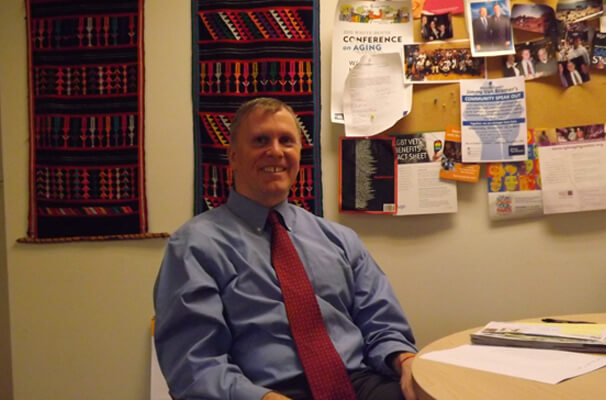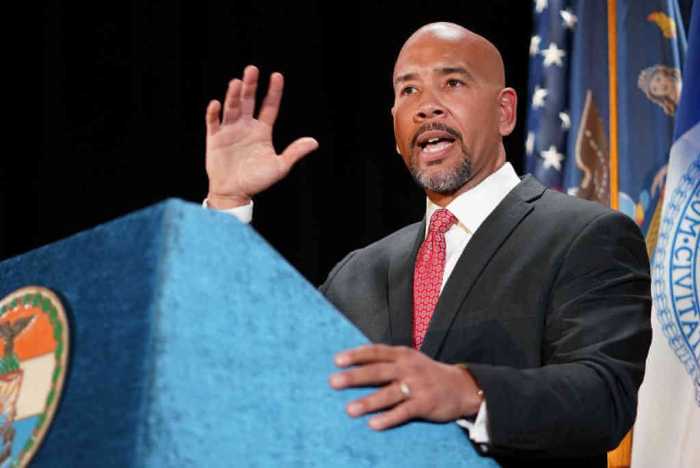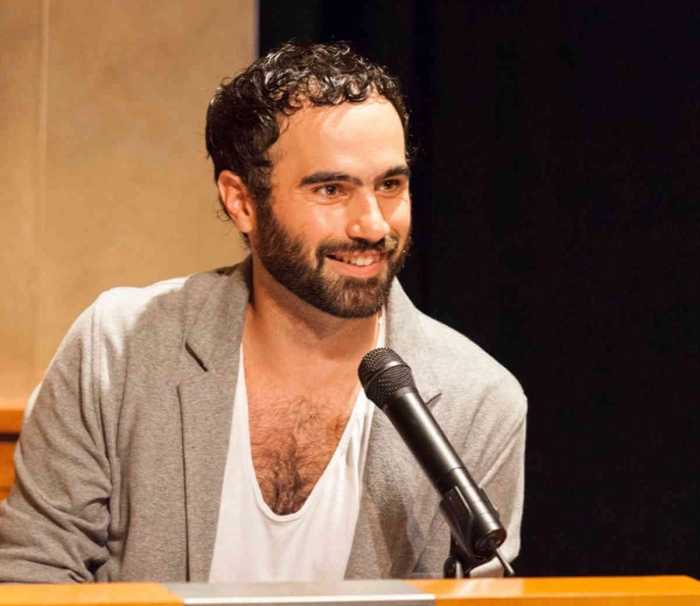SAGE executive director Michael Adams in the group's Seventh Avenue offices in Chelsea. | GAY CITY NEWS
Demonstrating the extent to which the community has broadly integrated itself into the civic life of New York City, the leading organization serving LGBTQ seniors in New York City will purchase its Manhattan headquarters using financing made possible by the city’s Economic Development Corporation (EDC).
“Were it not for the bond financing, we probably would not have been able to do this,” said Michael Adams, the chief executive at Services and Advocacy for GLBT Elders (SAGE).
The $8.2 million in bonds are issued by BuildNYC, a corporation that is administered by the EDC, and that has issued roughly $3 billion in bonds since 2011. The bonds will be purchased by JPMorgan Chase and will pay 3.24 percent in interest, a rate about 20 percent below what SAGE would pay if it used a commercial loan from a bank, according to Johan Salen, the executive director of BuildNYC.
Partnership with city’s Economic Development Corporation allows senior advocacy group to secure its future
By using bond financing, as opposed to a loan, SAGE avoids the requirement of having to raise a down payment, which would be prohibitively expensive. And its debt service will be less than what it currently pays in rent so the agency will realize substantial savings of about $3 million over time.
“That’s why using bond financing is such a great option,” Adams said.
SAGE will now own two floors in the Seventh Avenue building it calls home in Chelsea. The bonds will finance the purchase of its offices on the fifth floor. In 2011, SAGE spent $2.7 million in city capital dollars to buy the 15th floor where it houses its major services, such as its meal program. The higher price for the fifth floor reflects the hot real estate market in the city.
“That’s the nature of Manhattan real estate, which is why it’s so hard for non-profits to own,” Adams said.
Had SAGE relied on city capital dollars this time, it may have had to pay a higher interest rate and it would have taken longer, perhaps months longer, to complete the financing. Today, sellers may not be willing to wait.
“Now, you really can’t do that because no seller is going to wait that long,” Adams said.
In 1983, when the city sold what is now known as the Lesbian, Gay, Bisexual & Transgender Community Center, the community was required to raise the $150,000 down payment, an amount that was reduced to just under $105,000 in the 1984 deed. The city financed the deal, initially charging the Center 12 percent on the $1,350,000 in principal, and the payments began at just over $3,500 a month and then grew to just over $10,600 a month two years later. The interest was capped at 15 percent, but it could also never fall below nine percent. The monthly payments varied according to projections for how long it would take to pay off the loan.
Ed Koch, then the mayor, wanted to put the 75-year-old building up for auction, but he was opposed by other elected officials and the local community board.
“Both symbolically and practically, it says we’re here for the long haul,” Adams said of the current SAGE purchase, adding that in 2016 the city is a more supportive entity.
“It certainly reflects progress in terms of local government being a partner now,” he said.
The city is not taking on any risk with the SAGE deal, and there is no tax on the interest that the bonds pay.
“The city and the EDC, we’re not taking on any risk,” Salen said. “We looked through all of their financials. It’s a complete due diligence on the borrower.”
SAGE, which was founded in 1978, serves 2,600 New York City clients and operates four other centers in the city. It also has 28 affiliates across the nation. The agency is building 145 units of senior housing in Brooklyn and 82 units in the Bronx.
As an owner, SAGE can now renovate its cramped offices, which support both its local and national programs, though the logistics of a renovation will be difficult since on a recent visit to the offices, it appeared there was no space to spare.
“That’s why we have to own it,” Adams said. “If you don’t own it, you’re not going to invest in construction.”



































